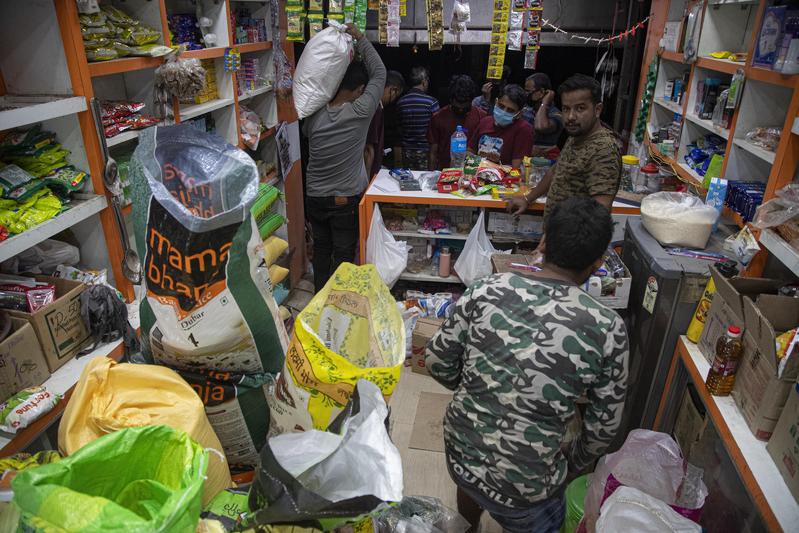 Indians buy essential commodities in a grocery shop in Gauhati, India, March 24, 2020. Indian Prime Minister Narendra Modi has decreed a 21-day lockdown across the nation of 1.3 billion people "to save India" from the coronavirus pandemic.The highly contagious COVID-19 coronavirus can cause mild symptoms, but for some it can cause severe illness including pneumonia. (ANUPAM NATH / AP)
Indians buy essential commodities in a grocery shop in Gauhati, India, March 24, 2020. Indian Prime Minister Narendra Modi has decreed a 21-day lockdown across the nation of 1.3 billion people "to save India" from the coronavirus pandemic.The highly contagious COVID-19 coronavirus can cause mild symptoms, but for some it can cause severe illness including pneumonia. (ANUPAM NATH / AP)
NEW DELHI/BENGALURU — Indians crowded grocery stores and chemists on Wednesday in a struggle for essential items after Prime Minister Narendra Modi ordered a total lockdown for three weeks to fight a coronavirus pandemic, one of the toughest such measures worldwide.
India’s tally of 536 cases and 10 deaths is dwarfed by China, Italy and Spain, but Modi and health experts have warned that the nation of 1.3 billion people faces a tidal wave of infections if harsh steps are not taken.
There are no clear instructions, police are telling us to close down the shop
Ram Agarwal, a grocer in Delhi
People in the key cities of Delhi, Mumbai and Bengaluru rushed to stock up after Modi decreed the shutdown in a speech televised nationwide, barely four hours before it took effect.
As states shut their borders, long queues of trucks carrying milk, fruits and vegetables snaked down highways, even though Modi said essential services would be maintained countrywide.
“There are no clear instructions, police are telling us to close down the shop,” said Ram Agarwal, a grocer in Delhi swamped by people looking to buy dry food supplies and milk.
Disruptions to online services added to people’s woes.
Walmart Inc’s Flipkart has suspended services, the Indian e-commerce firm said in a notice on its website as the lockdown began. Amazon India’s pantry service, which delivers groceries, was also not available in several cities.
Anthony Thomas, a worker at a small online milk delivery service, who normally distributes 150 liters of milk and groceries in Delhi each morning, said his employer had told him to stay home.
“There is no information yet on tomorrow’s supplies,” he added.
ALSO READ: India's huge outsourcing industry struggles with work-from-home scenario
Modi’s sweeping action aims to rein in the spread of the virus in India’s many small towns after a first wave of infections in Delhi, the capital, the commercial hub of Mumbai, and other big cities.
Cases reported from the remote parts of the western state of Maharashtra have fueled concerns about the ability of the public health system, notoriously starved of resources, to cope.
India has just 0.5 hospital beds for every 1,000 people, compared to 4.3 in China and 3.2 in Italy.
Nobody in the world’s biggest democracy will be allowed to leave home for the next three weeks, Modi said.
“Every district, every lane, every village will be under lockdown,” he said, warning that India’s development would be set back decades if it did not shut down to fight the virus.
But shutting down a US$2.9-trillion economy would cause widespread damage and especially hurt the poorest people, some experts said.
“The need of the hour is an economic package,” said Madhura Swaminathan, head of the economic analysis unit of the Indian Statistical Institute in the technology hub of Bengaluru.
READ MORE: India under 21-day lockdown, Thailand to declare emergency
“Asking people to stay at home is necessary, but that won’t be enough for the majority of the population who cannot afford to sit at home without work and pay.”
Authorities are scrambling to throw up defenses against the virus across South Asia, home to a quarter of the world’s population.
Four service members of the NATO mission in Afghanistan tested positive for the virus shortly after arrival, becoming its first infections, NATO said on Tuesday.


